Berlin’s rich history of sexuality and LGBTQ+ culture is brought to life through the captivating "Berlin’s History of Sex – Guided Augmented Reality Tour." Led by a sociologist guide, this immersive experience takes visitors on a journey through the city’s influential past. From the pioneering work of sexologist Magnus Hirschfeld to the vibrant 1920s lesbian club scene, the tour sheds light on Berlin’s pivotal role in the history of sex and sexuality. Augmented reality technology enhances the experience, transporting participants back in time and revealing the stories behind the city’s most significant sites. This is a must-visit opportunity to uncover Berlin’s fascinating, and often hidden, legacy.
Key Points
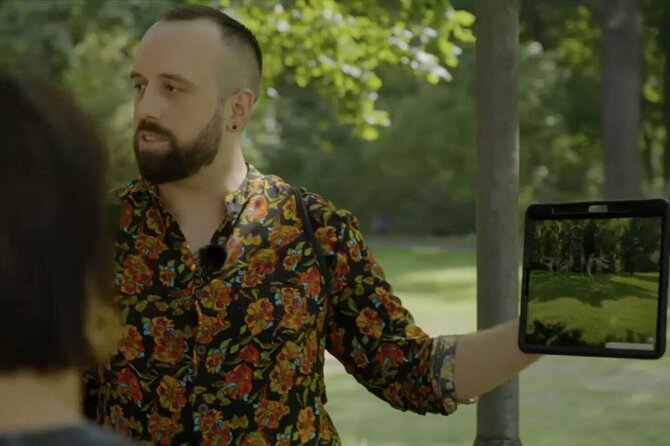
- This guided walking tour explores Berlin’s captivating history of sex and sexuality, focusing on sites like Bülowstrasse, Tiergarten, and the LGBTQ memorial.
- The tour delves into Berlin’s legacy as a hub for sexual science and queer culture, highlighting the work of pioneering sexologist Magnus Hirschfeld.
- Guests will learn about the vibrant 1920s lesbian club scene and the infamous Eldorado cabaret, which embodied Berlin’s hedonistic reputation and LGBTQ+ empowerment.
- The tour examines the writings of novelist Christopher Isherwood, who chronicled the city’s underground queer scene and its influence on perceptions of queer identity.
- The LGBTQ memorial in Tiergarten serves as a poignant reminder of the discrimination and oppression faced by the LGBTQ community, as well as their resilience and pursuit of equality.
Overview of the Tour
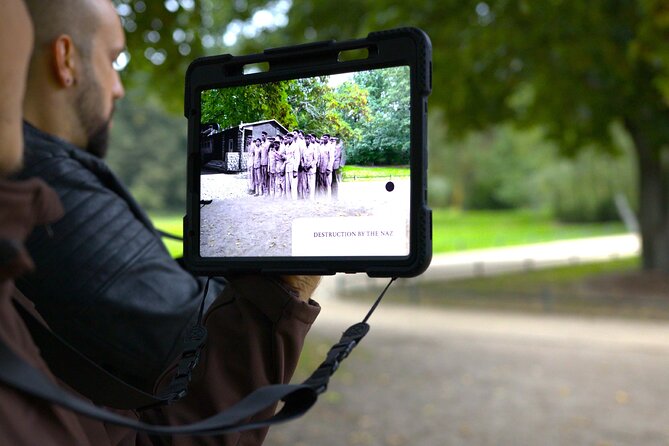
The guided walking tour offers an immersive exploration of Berlin’s storied history of sex and sexuality, led by a knowledgeable sociologist guide.
Focusing on sites like Bülowstrasse, Tiergarten, and the LGBTQ memorial, the tour delves into Berlin’s legacy as a hub for sexual science and queer culture. Participants will discover the pioneering work of sexologist Magnus Hirschfeld, the writings of gay novelist Christopher Isherwood, and the vibrant 1920s lesbian club scene.
The tour is limited to 10 travelers to ensure an intimate and interactive experience. With wheelchair and stroller accessibility, this guided tour provides an engaging and educational look at Berlin’s fascinating sexual past.
Loving the local insights? Here are more guided experiences we recommend in Berlin
Exploring Berlin’s Sex History
Although Berlin’s reputation as a hedonistic haven has long been established, the city’s rich history of sex and sexuality is often overlooked by casual visitors.
The guided tour delves deep into this captivating narrative, uncovering the pivotal role Berlin played in the field of sexual science and the evolution of LGBTQ+ culture.
Guests will discover the legacy of pioneering sexologist Magnus Hirschfeld, whose groundbreaking work laid the foundation for modern gender and sexuality studies.
They’ll also explore the vibrant 1920s lesbian club scene and the infamous Eldorado, a cabaret that pushed the boundaries of sexual expression.
Throughout the tour, the guide weaves together these stories, bringing Berlin’s provocative past to life in vivid detail.
Pioneering Sexologist Magnus Hirschfeld
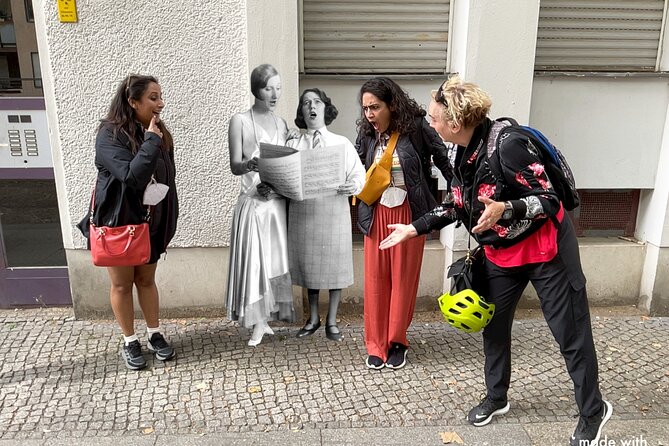
One of the most influential figures in Berlin’s storied history of sex and sexuality was Magnus Hirschfeld, a pioneering sexologist whose groundbreaking work laid the foundation for modern gender and sexuality studies.
Hirschfeld founded the Institute for Sexual Science in 1919, which became a hub for research, education, and advocacy around LGBTQ+ rights. He was a vocal advocate for sexual minorities at a time when homosexuality was criminalized, and his institute provided services like sex reassignment surgery.
Though the institute was later destroyed by the Nazis, Hirschfeld’s legacy lives on as a trailblazer who challenged societal norms and paved the way for greater acceptance and understanding of diverse sexualities.
Gay Novelist Christopher Isherwood
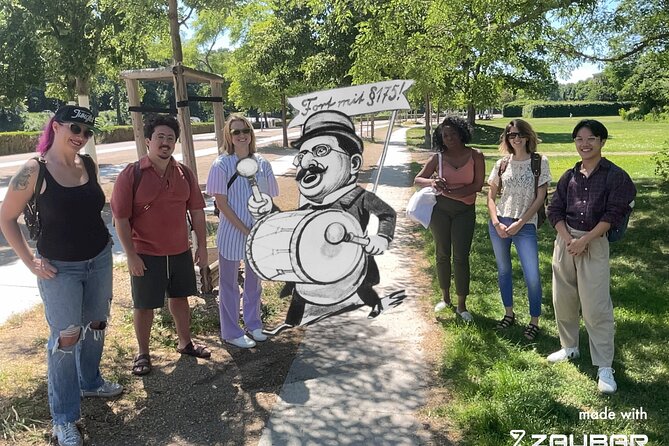
Alongside pioneering sexologist Magnus Hirschfeld, gay novelist Christopher Isherwood also left an indelible mark on Berlin’s vibrant LGBTQ+ history during the early 20th century.
As a British expat, Isherwood chronicled the city’s underground queer scene in his famous works, including ‘Goodbye to Berlin,’ which was later adapted into the musical ‘Cabaret.’ Isherwood’s stories offered a vivid depiction of Berlin’s nightlife, from the notorious Eldorado club to the hidden lesbian bars that thrived during the Weimar era.
Visitors on the guided tour can:
- Explore the settings that inspired Isherwood’s writings
- Learn about his relationship with artist Don Bachardy
- Discover how Isherwood’s work shaped perceptions of queer identity
1920s Lesbian Clubs

In the vibrant Weimar-era Berlin, a network of discreet lesbian clubs flourished, providing a rare haven for the city’s queer women to gather, socialize, and celebrate their identities.
These underground venues, such as the infamous Eldorado, offered a safe space for lesbians to explore their sexuality and participate in an emerging subculture.
Frequented by writers, artists, and intellectuals, these clubs hosted raucous parties, cabarets, and performances that defied traditional gender norms.
Despite the social stigma, these spaces allowed lesbian Berliners to cultivate a sense of community and visibility during a tumultuous and progressive period in the city’s history.
Fascinated by Berlin's past? More historical tours we've covered
- Private Berlin Complete History All Day Walking Tour
- The History of Berlin: WWII PRIVATE Walking Tour With Locals
- Berlin Craft Beer and Cultural Tour With Snacks
- Berlin History Walking Tour With a French-Speaking Guide
- Historic Center of Berlin – Tour in English
- Third Reich and Berlin Wall History 3-Hour Bike Tour in Berlin
Infamous Eldorado Club
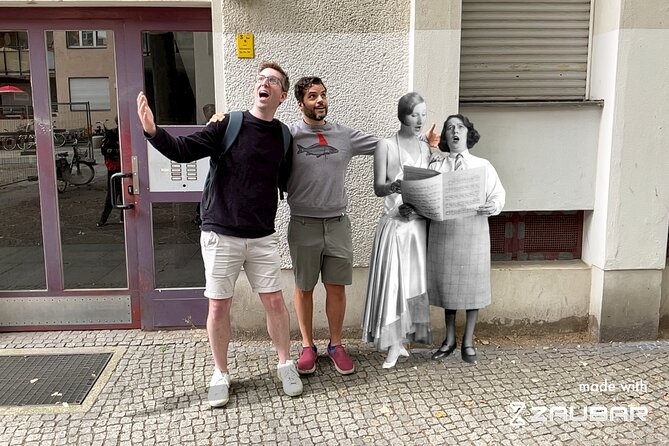
At the heart of Berlin’s infamous Eldorado club, queer women found a sanctuary to openly explore their sexuality and cultivate a vibrant subculture during the tumultuous Weimar era.
This legendary nightclub embodied the city’s hedonistic reputation, attracting a diverse clientele drawn to its liberating atmosphere. The Eldorado stood as a symbol of LGBTQ+ empowerment, offering a rare public space for self-expression and community building.
Some key features of this iconic venue included:
- A lavish cabaret stage that showcased daring performances and drag acts
- Discreet private rooms where patrons could mingle and connect
- An acceptance of fluid gender expression and sexuality
The Eldorado’s legacy endures as a testament to Berlin’s pioneering spirit and the power of LGBTQ+ spaces to foster radical social change.
LGBTQ Memorial
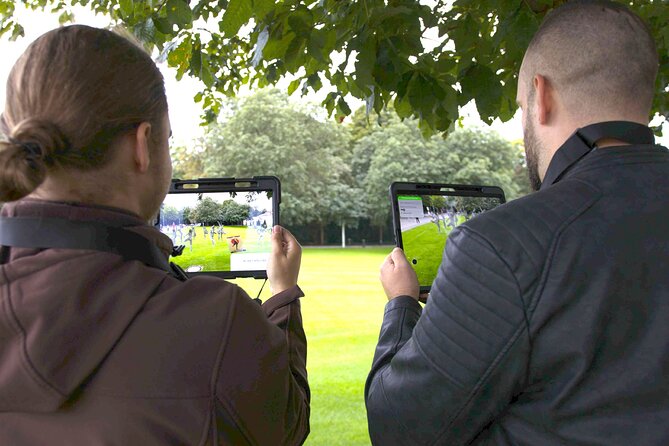
The LGBTQ Memorial in Berlin’s Tiergarten serves as a powerful reminder of the city’s history as a beacon of queer liberation and resilience.
Inaugurated in 1984, the monument features a concrete slab with a window that casts a beam of light onto the ground below. This simple yet profound design symbolizes the discrimination and oppression faced by the LGBTQ community, as well as their ongoing struggle for visibility and acceptance.
Visitors can reflect on this painful past and honor the courage of those who fought for LGBTQ rights, both in Berlin and around the world. The memorial stands as a testament to the resilience of the queer community and its unwavering pursuit of equality and justice.
Practical Tour Information
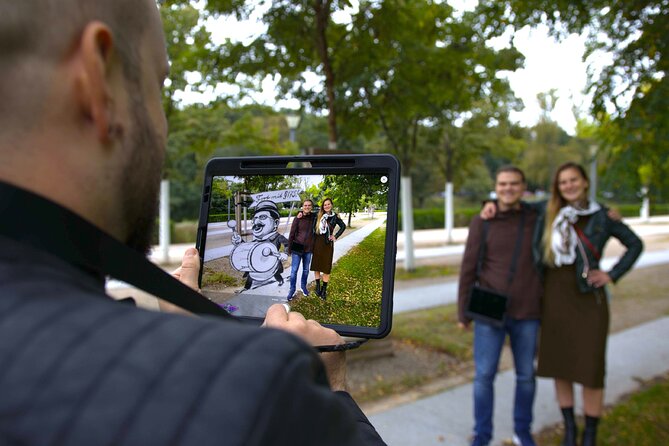
Where does the tour meet? The tour meets at Schloss Bellevue, 10557 Berlin.
This sex history tour is wheelchair and stroller accessible, ensuring it’s inclusive for all travelers. The minimum age for the tour is 18 years, keeping it appropriate for an adult audience.
Confirmation is received at the time of booking, so you’ll have all the details before your experience.
You can cancel up to 24 hours before the tour for a full refund, providing flexibility. Changes less than 24 hours before aren’t accepted, so be sure to plan ahead.
With a maximum of 10 travelers, this guided tour offers an intimate and personalized look at Berlin’s storied past. An iPad Pro is also provided to enhance the experience.
Frequently Asked Questions
Is Photography Allowed During the Tour?
Yes, photography is allowed during the tour. The tour guide encourages guests to take photos, as long as they’re respectful and mindful of other participants’ privacy.
What Happens if the Tour Is Affected by COVID-19 Restrictions?
If the tour is affected by COVID-19 restrictions, the organizers will cancel the experience and provide a full refund. They aim to ensure the safety and comfort of all guests during these uncertain times.
Can the Tour Be Customized for a Private Group?
Yes, the tour can be customized for private groups. The tour operator offers private group bookings, allowing customers to tailor the experience to their specific interests and group size. This provides a more personalized and intimate exploration of Berlin’s sex history.
Are There Any Food or Drink Options Included in the Tour?
The tour doesn’t include any food or drink options. However, the tour guide can provide recommendations for nearby cafes, restaurants, and bars where participants can enjoy refreshments before or after the tour.
How Accessible Is the Tour for People With Disabilities?
The tour is wheelchair and stroller accessible, making it inclusive for travelers with disabilities. The guide is knowledgeable and can accommodate any special needs to ensure everyone has an enjoyable experience.
Recap
The Berlin’s History of Sex – Guided Augmented Reality Tour offers a captivating exploration of the city’s influential legacy in the fields of sexuality and LGBTQ+ culture.
Through immersive storytelling and augmented reality, participants explore the lives of pioneering figures like Magnus Hirschfeld and Christopher Isherwood, while uncovering the vibrant history of the 1920s lesbian club scene and the LGBTQ memorial.
More Guided Tours in Berlin
More Tours in Berlin
- Berlin: 2-Hour Premium Segway Tour
- Berlin: Hidden gems around the Gendarmenmarkt – Guided walking tour
- Berlin: Guided group tour of Kreuzberg 36, the alternative district
- Tour in Berlin from Warnemünde and Rostock Cruise Port
- Berlin: Guided Street Food Tour with Tastings
- Potsdam: Original steam ship Gustav from 1908. Coal-fired, boat tour
More Tour Reviews in Berlin
Not for you? Here's more things to do in Berlin we have recnetly reviewed
- Potsdam: 5-Hour-Tour “Parks & Palaces” from Berlin by VW-Bus
- Berlin: guided canoe | kayaktour
- Berlin: 3-Hour Guided Small Group Fat Tire E-Scooter Tour
- Rickshaw private driver, shared Guide Berlin Highlights
- Berlin: Madame Tussauds Happy Hour Ticket
- Berlin: Green City Guided Bike Tour
- VIP Warnemünde-Berlin: Private Shore Excursion with a Van
- Understanding Kreuzberg: The roots of local (sub)culture
- Tranfer with small or Bigger introduction Tour Berlin
- Private Tour – Highlights of Berlin for Families
- Berlin: Germany’s Very first Craft Beer Tour and Experience
- Private Highlights of Berlin Bike Tour
